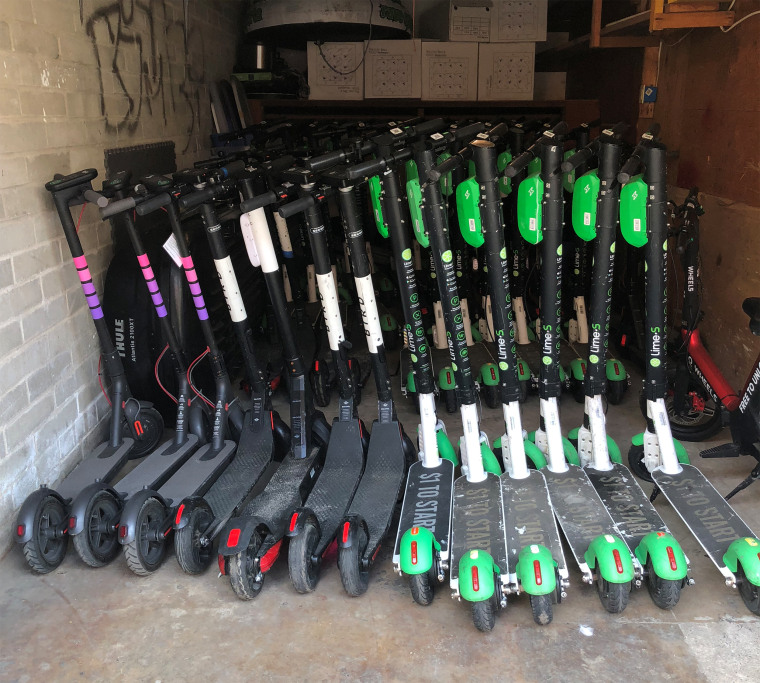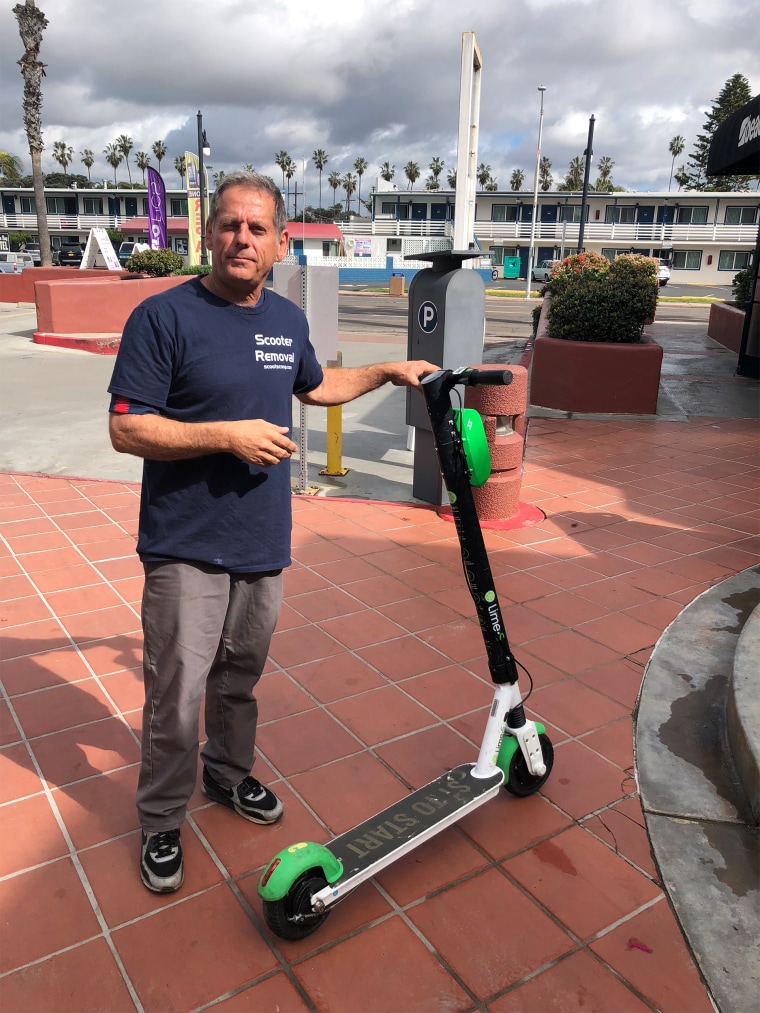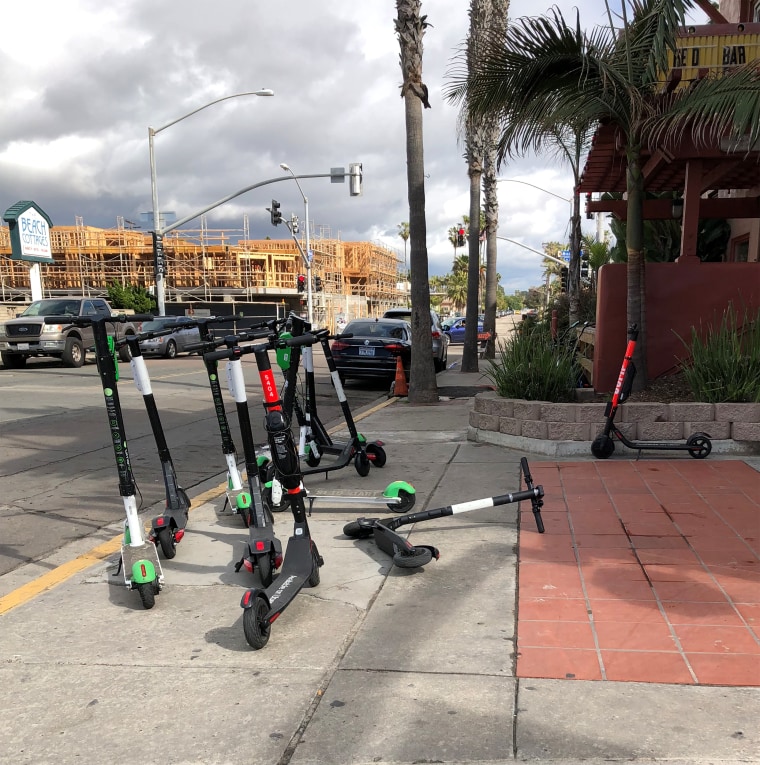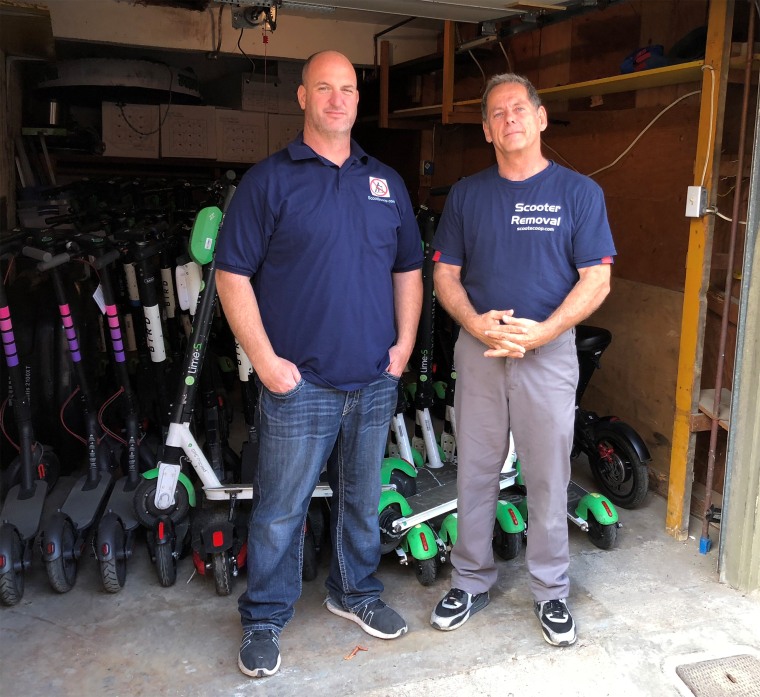SAN DIEGO — Morning showers had moved far enough east that hung-over tourists were beginning to stretch into the winter sun. The lunchtime crowd was catching a whiff of the first patties at Woody's Breakfast and Burgers as the nearby boardwalk was beginning to buzz with the usual odds and ends — graybeards gawking, surfers kicking back after a morning session and visitors on ubiquitous e-scooters.
One rider pulled into Pacific Beach boardwalk traffic without looking as a couple on their own e-scooters raced north, prompting a familiar hiss of sneakers sliding on sandy concrete: collision avoided. "You didn’t have to stand here very long to hear a, 'Sorry bro,'" said Dan Borelli, who owns a bike and skate rental shop nearby.
The fresh presence of tens of thousands of dockless scooters for rent in San Diego over the last year has driven some locals absolutely loco. Alexander Curtis, general manager of Woody's, says e-scooter users "drop them off right in front," where travelers and the elderly alike trip over the devices.

Woody's and neighboring eatery World Famous, however, have their own e-scooter bounty hunters who scoop them up day and night and store them until the Silicon Valley-backed concerns that put them on the street pay up. Borelli teamed up with business partner John Heinkel in January to officially launch a company, ScootScoop, that impounds e-scooters at the behest of private property owners.
The duo already has 4,500 of them packed in warehouses and garages. Most of the scofflaws pay their bounty, but a few of the half dozen or so e-scooter companies active in San Diego aren't on board.
"The big ones aren’t playing ball," Borelli said. "They want their product back."
ScootScoop charges the companies $30 to release each e-scooter. Its freelance workers will also move or stand up a scooter that's blocking walkways or roads. The cost to the scooter firms is $3 to $5. ScootScoop contractors take photos to show their homework.
ScootScoop is also developing an app where San Diego business owners can drop a pin on a map to alert the "scoopers" to an interloper that needs to be impounded within 24 hours. The pair also hopes to go global by using a model whereby satellite operators pay licensing fees. They say they've already had inquiries from entrepreneurs in Mexico and Australia.
The duo behind ScootScoop says their business shouldn't be so urgent. At least some of the e-scooter companies' user agreements specify fines as much as $150 for leaving the devices in forbidden zones, including on private property. But they say the rules aren't enforced by the firms for fear of slowing explosive market growth.
A few of the big e-scooter companies employ freelance armies of their own to grab out-of-bounds scooters, charge them up and repair them if necessary.
"We’re always working to create the best experience for riders and their communities, including actively relocating scooters if they are found parked incorrectly," Lyft Scooters spokeswoman Kaitlyn Carl said in an email. "Lyft's local operations teams work daily to retrieve improperly parked scooters as fast as possible."
Some have threatened to sue ScootScoop, but so far none have filed complaints.
"The community should be careful when engaging with pop-up companies claiming to provide city services like impounding or towing," Lime Electric Scooter Rentals spokeswoman Mary Caroline Pruitt said via email. "Impounding bikes or scooters requires compliance with the California Vehicle Code, and Lime is in the process of reviewing whether these pop-ups are committing violations which may subject them to liability."
But ScootScoop's owners say neighboring businesses in San Diego "reached out to us and said we can’t take these scooters anymore," according to Borelli.
Partner Heinkel said his kids grew up on the Pacific Beach boardwalk. "I couldn't put my kids out here now," he said as e-scooters raced by. "Can you imagine a Big Wheel on this boardwalk?"
The Mission Beach Town Council, which represents the community immediately south of ScootScoop's base, recently took an advisory vote against e-scooters.
"We want to ban them from the boardwalk," said town council president Matt Gardner. "It’s just too dangerous."
Critics believe the e-scooter companies "dumped" thousands of the dockless vehicles on San Diego because it's an ideal city for the business — it's dense enough to go car-free, and it attracts nearly 36 million visitors annually.

"San Diego was the land of the beach cruiser," Borelli said, describing the classic bicycle with balloon tires and motorcycle-style handlebars. "It was the ideal thing to get around here at a leisurely, safe pace. The e-scooter has been put it in the rear-view mirror."
Heinkel said he advises tourists who still want to rent bicycles to stay away from the boardwalk.
Walter Biffl, medical director of trauma at nearby Scripps Memorial Hospital La Jolla, said one in 10 transportation injuries at the institution is now e-scooter-related.
The San Diego City Council was still developing rules for e-scooters that could include operations fees, speed limits and parking rules.
"The regulations are intended to mitigate many of the issues that have arisen out of this new and evolving industry, including the issue of improperly parked or abandoned vehicles," Greg Block, spokesman for Mayor Kevin L. Faulconer, said by email.
But it might be too late.
A suit filed in federal court on behalf of four disabled San Diegans names the city as well as Bird Rides, Lime and other e-scooter companies, alleging they're violating the Americans with Disabilities Act by allowing the vehicles to pile up and inhibit access to sidewalks.
The suit seeks class-action status, undisclosed cash damages and an end to e-scooters on walkways.

Plaintiff Alex Montoya, a motivational speaker, is a congenital triple amputee who wears prosthetics and does not drive.
"I feel like my safety and my life is in jeopardy," said the downtown-area resident. "Scooters are left on the sidewalk or they're cruising by at top speeds."
The suit estimates those speeds at 20 miles an hour and says the vehicles violate city law that prohibits obstruction of sidewalks and state law that requires them to use the street.
"Plaintiffs continue to be deterred from leaving their homes and their places of business since the invasion of these Scooters onto the streets of the City of San Diego," the filing reads.
Montoya said he welcomed an enterprise like ScootScoop but "it’s unfortunate that a third party has had to intervene."
"I think the same companies that make profit by putting scooters out there should also be responsible for pickup and removal," he said.
CORRECTION (Feb. 28, 2019, 9:48 p.m. ET): An earlier version of this article omitted the last name of a spokeswoman for Lime Electric Scooter Rentals. She is Mary Caroline Pruitt, not Mary Caroline.


